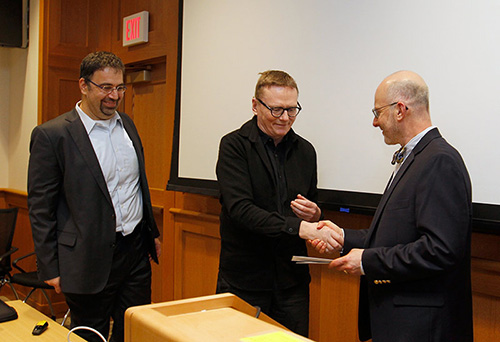Nobel Prize winners in economics recognized by the Department of Political Science
Laureates received the William H. Riker Prize in 2017.

Two of the three economists awarded the 2024 Nobel Memorial Prize in Economic Sciences were recognized by the University of Rochester’s Department of Political Science for their work seven years earlier.
Daron Acemoglu and Simon Johnson, of the Massachusetts Institute of Technology, and James Robinson, of the University of Chicago, received the Nobel for their work on why prosperity gaps persist between nations.
Their research suggests that countries with “inclusive” political and social institutions tend to be more economically prosperous in the long term than those with authoritarian institutions that are designed primarily to keep people in power in control.
“Reducing the vast differences in income between countries is one of our time’s greatest challenges,” Jakob Svensson, chairman of the economics prize committee, said in a statement. “The laureates have demonstrated the importance of societal institutions for achieving this.”
In 2017, the Department of Political Science awarded Acemoglu and Robinson the William H. Riker Prize in Political Science for their research. That distinction recognizes scholars who advance the scientific study of politics in the spirit of its namesake.
Riker pioneered the application of game theory and mathematics to political science and established the University of Rochester as a force in the field of study as chair of its Department of Political Science at Rochester from 1962 to 1977.
Acemoglu and Robinson visited the River Campus to receive their award as celebrated authors of their international best-selling book, Why Nations Fail: The Origins of Power, Prosperity, and Poverty, published in 2012.
While on campus, they spoke of their latest research at the time, much of which they incorporated into their next book, The Narrow Corridor: States, Societies, and the Fate of Liberty, published in 2019.
The prosperity of nations, they argued, depends above all on the inclusiveness of their political and social institutions. They defined “inclusive” as large numbers of people having a say in political decision making. Inclusive institutions, they argued, promote economic prosperity because they provide an incentive structure that rewards talent and creativity.
The third Nobel winner, Johnson, has a link to the city of Rochester.
The MIT economist noted in a book he co-authored in 2019, Jump-Starting America: How Breakthrough Science Can Revive Economic Growth and the American Dream, that Rochester was poised to become a technology hub and an economic driver on a national scale.
